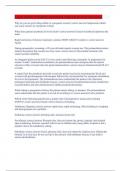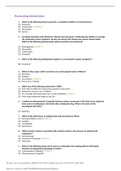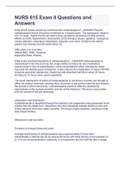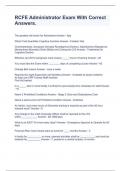Cholinesterases Study guides, Class notes & Summaries
Looking for the best study guides, study notes and summaries about Cholinesterases? On this page you'll find 24 study documents about Cholinesterases.
Page 3 out of 24 results
Sort by

-
Capa Study (Possible questions with error-free answers)
- Exam (elaborations) • 2 pages • 2023
- Available in package deal
-
- $7.99
- + learn more
Why do you not given Mag sulfate to a pregnant woman? correct answers Magnesium sulfate can cause seizures in a pregnant woman. What does general anesthesia do to the heart? correct answers General Anesthesia depresses the heart. Rapid correction of chronic respiratory acidosis MOST LIKELY results in: correct answers Apnea. During preoperative screening, a 28-year old male reports cocaine use. The perianesthesia nurse informs the patient that cocaine use may cause: correct answers Myoca...
RCFE Administrator Exam With Correct Answers.

-
PHARMACOLOGY QUESTIONS
- Exam (elaborations) • 9 pages • 2022
-
- $13.49
- + learn more
1. Which of the following drugs is generally a competitive inhibitor of cholinesterases? (A) Donepezil (B) Galantamine (CORRECT) (C) Memantine (D) Tacrine 2. An elderly Australian with Alzheimer's disease has been given a cholinesterase inhibitor to manage the moderately severe symptoms. He also has chronic liver disease due chronic alcohol intake. Which of the following pharmacologic options would be most preferred? (A) Rivastigamine (CORRECT) (B) Memantine (C) Galantamine ...

-
NURS 615 Exam II Questions and Answers
- Exam (elaborations) • 10 pages • 2022
-
- $9.99
- + learn more
What blood values should be monitored with carbamazepine? - ANSWER Plasma carbamazepine levels should be monitored on a regular basis. The therapeutic range is 4 to 12 mcg/L. Higher levels can lead to toxic symptoms consisting of initial adverse effects and also hypertension, tachycardia, ECG changes, stupor, agitation, nystagmus, urinary retention, respiratory depression, seizures, and coma. Children and elderly patient may develop toxicity levels below 12. CBC every 3 to 4 months Affects R...

That summary you just bought made someone very happy. Also get paid weekly? Sell your study resources on Stuvia! Discover all about earning on Stuvia



